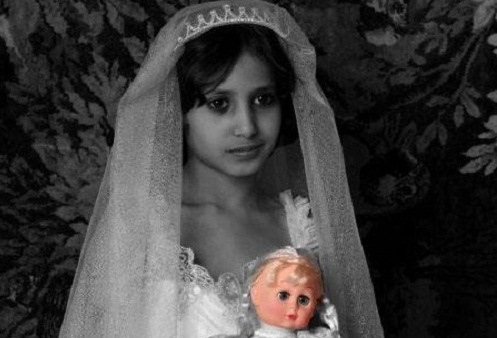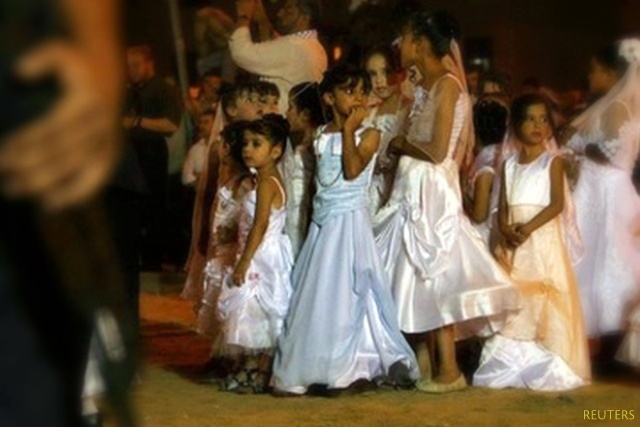In communities where poverty and illiteracy are rife, you invariably see girls under the age of eighteen being married to men often much older. UNCIEF defines marriage under the age of eighteen as child marriage.
A survey published by the National Council for Women illustrated that in Egypt the percentage of girls being married before the age eighteen is 22 percent which rises in governorates of Port Said and Fayoum to 38 percent.
When families live under dire circumstances, parents often have no choice but to witness their daughters leaving the family home to start their own family. Some girls are as young as eleven when they are promised to a man. And as Egypt sadly continues to struggle with economic strain, many parents resort to sham nuptials which can last as little as a few hours to a few years.
“Marriage brokers” can take girls from the age of eleven from villages to rich Arab visitors staying in hotels in the cities of Egypt. A one day “muta’ (or pleasure marriage) can be arranged by the “marriage brokers” for as little as LE800 which is then split between the broker and the child’s parents. Or there is a summer long “misyar” marriages which can be charged between LE20,000 and LE70,000.

For the duration of the marriage, this temporary contract offers a way to outwit Islamic restrictions on pre-martial sex and allows the husband and wife to stay in the same hotel rooms or apartments. This legally binding contract then ceases when the man chooses to return to his home country. Some families see this as an opportunity for their daughter but invariably their poverty forces them to make such choices.
But the debate on child marriage is not restricted to religious viewpoints but more prominently on cultural expectations. In some communities in Egypt, the expectation is that when a girl hits puberty then she ought to be married and most likely to a cousin or relative. Parents often see little point in waiting further when the child already appears to have developed fully into a woman.
Furthermore, cultural expectations, in some communities of Egypt, suggest that girls do not require an education. So, illiteracy perpetuates the problem of child marriage. If a child has not had the opportunity to complete her primary or middle school education then there is a higher chance that she will be married below the age of eighteen. Her illiteracy will not enable her to be able to leave a spiralling circle of deprivation or an opportunity to progress in further education.

Though there are many causes to child marriage in Egypt, the result of child marriage is far more troublesome. When girls particularly under the age of sixteen, are married, the risk of abuse, both physically and physiologically, is high. In addition, girls are more likely to miscarry in pregnancy or experience severe complications in their pregnancy. These difficulties can lead to unprecedented amounts of trauma to the girls and can stunt physical and mental development.
Many girls under the age of eighteen are not emotionally ready for the challenges of marriage so they too face many difficulties of knowing how to manage a home, a husband and a family effectively. Again, this adds pressure on the girl and can cause long term emotional damage.
Despite people knowing these facts and awareness being made across Egypt, girls are still being married at a young age. Many families resist change because it is altering age old traditions and beliefs. In addition, many families see little point on changing rules on child marriage because once they have found a suitor willing to pay a dowry, it seems apt that the marriage takes place, however, young the girl.
But, it is clear that if people and communities continue to insist that all girls have the opportunity to a full education then these girls will be empowered to make their own choices on their future, and when they are ready to marry and ready to start a family.
In studies, UNICEF found that “healthy, educated and empowered women are more likely to have healthy, educated and confident children.”
Further, education for parents is required in order for them to be fully aware of the risks of child marriage and the importance of education for girls. If this is done sensitively and respectfully then a future generation of females will be empowered to make healthy choices about their bodies and about future decisions, especially in further education. If this is done correctly, who knows what impact that could have on the Egyptian society.






Comments (5)
The minimum age of marriage in Egypt is 18. Although it might be a convenient excuse for hoteliers etc, to see a “marriage certificate” and thereby claim that their actions in renting a room to a husband and young wife were ethical, I don’t see how it can be considered a legally binding contract.
There are two distinct issues here, which I feel that you are conflating.
Firstly there is child sex tourism, under the guise of marriage, and secondly there is the cultural tolerance/encouragement of early marriage and forced marriage. These require different solutions.
Child sex tourism needs to addressed head on, with strong prosecutions for perpetrators who come to Egypt to exploit poor families and their daughters. The existence of these “marriage certificates” should assist tracking down down the perpetrators and prosecuting them as fully as possible, with no statue of limitations, allowing a victim of child sex tourism to bring a case against her rapist once she is an adult.
Other early marriages however has different causes, more in common with forced marriage – regardless of age – than with child prostitution. For some families there is a desire to marry their daughter to give her/the family a “protector”, in a country where women are shamed for sexual violence perpetrated against them; for others there is financial considerations – a suitor who will support their daughter and give her a reasonable dowry takes pressure from the family; and for others again, financial jiggery-pokery over land and property means that young women are used as totems of asset transfer.
These issues are much more deep seated and require more nuanced and long term solutions. Rape culture, poverty and women as tradeable assets will not disappear overnight, however in the meantime, married women who are under 18 have fewer rights than those over 18, as do their children. This needs addressed as an interim harm-reduction measure while efforts to stop forced marriages, and in particular forced marriage of U18s, are ongoing.
[…] http://egyptianstreets.com/2014/07/23/the-story-behind-child-brides-in-egypt/ […]